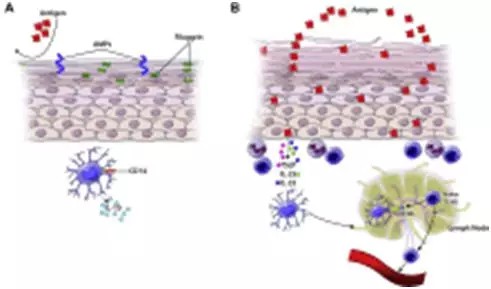JACI:細胞分子學層面對食物過敏和食物耐受的解釋
發(fā)布日期:2018-11-13
原標題:食物過敏和食物耐受的細胞分子學機理


Allergy
https://doi.org/10.1016/j.jaci.2016.02.004
Abstract:
Ingestion of innocuous antigens, including food proteins, normally results in local and systemic immune nonresponsiveness in a process termed oral tolerance. Oral tolerance to food proteins is likely to be intimately linked to mechanisms that are responsible for gastrointestinal tolerance to large numbers of commensal microbes. Here we review our current understanding of the immune mechanisms responsible for oral tolerance and how perturbations in these mechanisms might promote the loss of oral tolerance and development of food allergies. Roles for the commensal microbiome in promoting oral tolerance and the association of intestinal dysbiosis with food allergy are discussed. Growing evidence supports cutaneous sensitization to food antigens as one possible mechanism leading to the failure to develop or loss of oral tolerance. A goal of immunotherapy for food allergies is to induce sustained desensitization or even true long-term oral tolerance to food allergens through mechanisms that might in part overlap with those associated with the development of natural oral tolerance.
First Author:
R. SharonChinthrajahMD.
Correspondence:
Kari C.NadeauMD, PhD
All Authors:
Joseph HernandezMD, PhD ?Scott D.BoydMD, PhD Stephen J.Galli MD


——來自浙大迪迅
人體的免疫系統(tǒng)對攝入的無害抗原,包括食物蛋白,通常不會出現(xiàn)局部和全身免疫反應,這一過程被稱為口服耐受。對食物蛋白的耐受性可能與胃腸道對大量共生微生物的耐受性機制密切相關(guān)。在這里,我們回顧了目前對食物耐受的免疫機制的理解,以及這些機制中出現(xiàn)的干擾如何促進食物耐受的喪失和食物過敏的發(fā)展。討論了共生菌群在促進食物耐受中的作用以及腸道失調(diào)與食物過敏的關(guān)系。越來越多的證據(jù)支持皮膚對食物抗原的敏感性,認為這可能是導致耐受不能形成或耐受喪失的一種機制。對食物過敏進行免疫治療的目標是通過一些機制誘導對食物過敏原的持續(xù)脫敏,甚至是產(chǎn)生真正的長期耐受性,這些機制可能在一定程度上與天然食物耐受性的形成相重疊。
延伸閱讀

Allergy
[IF:13.1]
Molecular and cellular mechanisms of food allergy and food tolerancehttps://doi.org/10.1016/j.jaci.2016.02.004
Abstract:
Ingestion of innocuous antigens, including food proteins, normally results in local and systemic immune nonresponsiveness in a process termed oral tolerance. Oral tolerance to food proteins is likely to be intimately linked to mechanisms that are responsible for gastrointestinal tolerance to large numbers of commensal microbes. Here we review our current understanding of the immune mechanisms responsible for oral tolerance and how perturbations in these mechanisms might promote the loss of oral tolerance and development of food allergies. Roles for the commensal microbiome in promoting oral tolerance and the association of intestinal dysbiosis with food allergy are discussed. Growing evidence supports cutaneous sensitization to food antigens as one possible mechanism leading to the failure to develop or loss of oral tolerance. A goal of immunotherapy for food allergies is to induce sustained desensitization or even true long-term oral tolerance to food allergens through mechanisms that might in part overlap with those associated with the development of natural oral tolerance.
First Author:
R. SharonChinthrajahMD.
Correspondence:
Kari C.NadeauMD, PhD
All Authors:
Joseph HernandezMD, PhD ?Scott D.BoydMD, PhD Stephen J.Galli MD
2018-11-5 Review
創(chuàng)建過敏性疾病的科研、科普知識交流平臺,為過敏患者提供專業(yè)診斷、治療、預防的共享平臺。

 杭州浙大迪迅生物基因工程有限公司
杭州浙大迪迅生物基因工程有限公司

